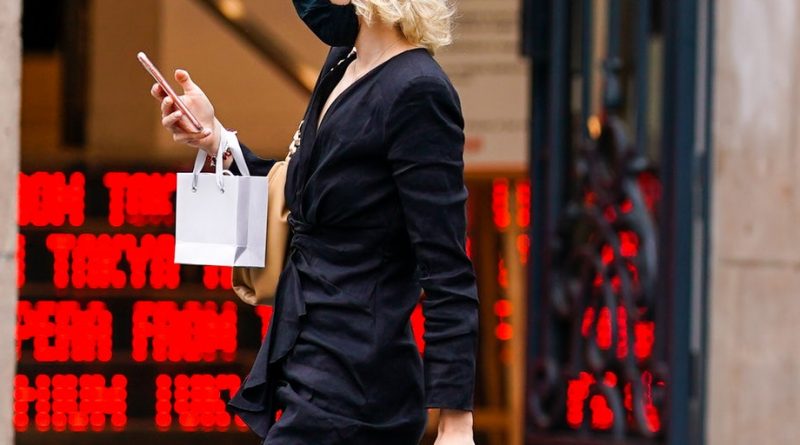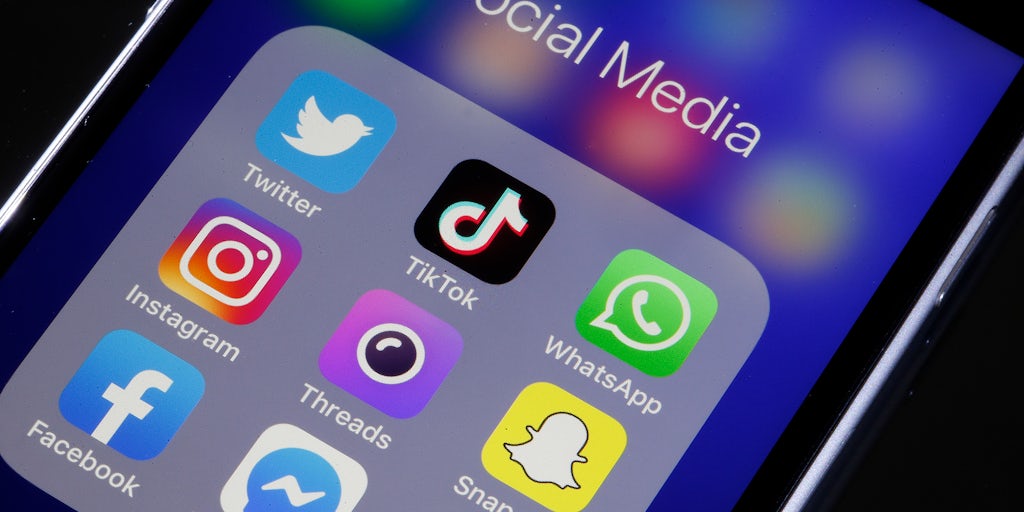Amid Pandemic, Luxury Leaders Seize Digital Opportunity to Gain on Rivals | BoF Professional, This Week in Fashion
This week, luxury groups LVMH and Kering, along with Hermès, Prada, Moncler and Ferragamo, reported their latest results. With coronavirus lockdowns at their peak, forcing store closures and grounding tourist travel, the second quarter delivered the worst performance in the history of the modern luxury industry. For some, the results were even more disastrous than analysts had expected. But luxury’s worst-ever quarter was also its best for digital sales.
At Moncler, e-commerce continued to grow by double digits year on year, despite the precipitous drop in consumer demand brought on by the virus. At Prada, digital sales more than doubled. At Kering’s Bottega Veneta, they nearly tripled. Meanwhile, LVMH Chief Financial Officer Jean-Jacques Guiony called the group’s recent e-commerce results “too good to be mentioned” lest they set a benchmark that would be impossible to sustain in future.
It’s not entirely surprising that, with boutiques shuttered, those still shopping for luxury goods flocked to e-commerce sites. From conference calls on Zoom to FaceTime with family members to ordering essentials on Amazon, the lockdowns forced billions of people, including hundreds of millions of late adopters, to become more familiar with the technology in their pockets, forming new patterns of behaviour. For some that meant shopping for luxury products online.
But as stores reopen, there is already evidence that the shift to e-commerce may stick, if not at lockdown levels then at least above sales volumes seen pre-pandemic. Earlier this week, Kering Chief Financial Officer Jean-Marc Duplaix noted “an acceleration in online sales, despite store re-openings,” calling the crisis “a catalyst for… the rapid development of e-commerce.”
“Who managed your digital revamp? Your CTO, your CEO? Neither, Covid-19!” said luxury analyst Erwan Rambourg, recounting a joke that’s been circulating in the industry this week. “It is a reality that the virus has been, in some instances, a very useful wake-up call.”
Even before the pandemic, e-commerce was a major opportunity. Online luxury sales grew by double digits in 2019. But under lockdown, many luxury brands, which have traditionally been slow to e-commerce, swiftly added new digital services to support what had overnight become their only way to drive sales. Some added new geographies to their e-commerce sites. Others added new digital payment methods or armed their sales associates with new digital tools.
“Instead of saying, ‘I’m x number of stores down,’ we have 12,000 stores now,” said Louis Vuitton Chief Executive Michael Burke back in April, referring to the brand’s 12,000 sales associates, each of whom had been armed with tools to clientele from their homes, becoming stores of their own.
Now, large parts of the world are inching towards greater normalcy, but neither consumers nor brands are likely to unlearn the digital behaviours they learned under lockdown, and Covid-19 is likely to prove a long-term accelerant for digital sales of luxury goods.
“During this time, when attitudes to shopping may be changing and habits may become even more online, I felt we needed not only an evolution, but a revolution in our digital culture,” said Remo Ruffini, chief executive of Moncler, which announced on Monday that it would directly manage its e-commerce business starting in 2021, ending a partnership with Yoox Net-a-Porter with the aim of doubling the share of sales done online to 20 percent over the next three years.
By comparison, sportswear giant Nike is poised to reach its goal of 30 percent digital sales two years ahead of its fiscal 2023 target and the company now expects to see e-commerce account for more than half its total business in the “foreseeable future,” according to Nike Chief Financial Officer Matt Friend. But what works for Nike won’t necessarily work for luxury brands.
According to Bain, e-commerce will account for 30 percent of the luxury market by 2025, but many believe the channel will plateau there and that physical stores will always be critical to luxury sales. “Luxury is still predominantly driven by recruitment rather than repeat purchases, and most first-time purchasers will want to experience products and storytelling in stores initially,” said Rambourg.
And yet, these days the vast majority of luxury sales, even if they take place in physical stores, are influenced by the interactions that consumers have online, making a truly omni-channel experience, connecting digital touchpoints to physical retail, one of the most important — and challenging — parts of a winning digital strategy for luxury brands. It’s telling that digital leader Burberry took its next step in this direction on Friday with the launch of a new “social retail” store in Shenzhen, developed in partnership with Chinese internet giant Tencent.
The coronavirus is set to weigh on luxury results for the foreseeable future. But sector-leaders are positioning themselves to use the growing opportunity in digital to gain share over their smaller rivals as the market contracts. As LVMH’s Guiony said earlier this week, we are “well positioned to become stronger in the crisis, which is exactly what leaders should do.”
THE NEWS IN BRIEF
FASHION, BUSINESS AND THE ECONOMY
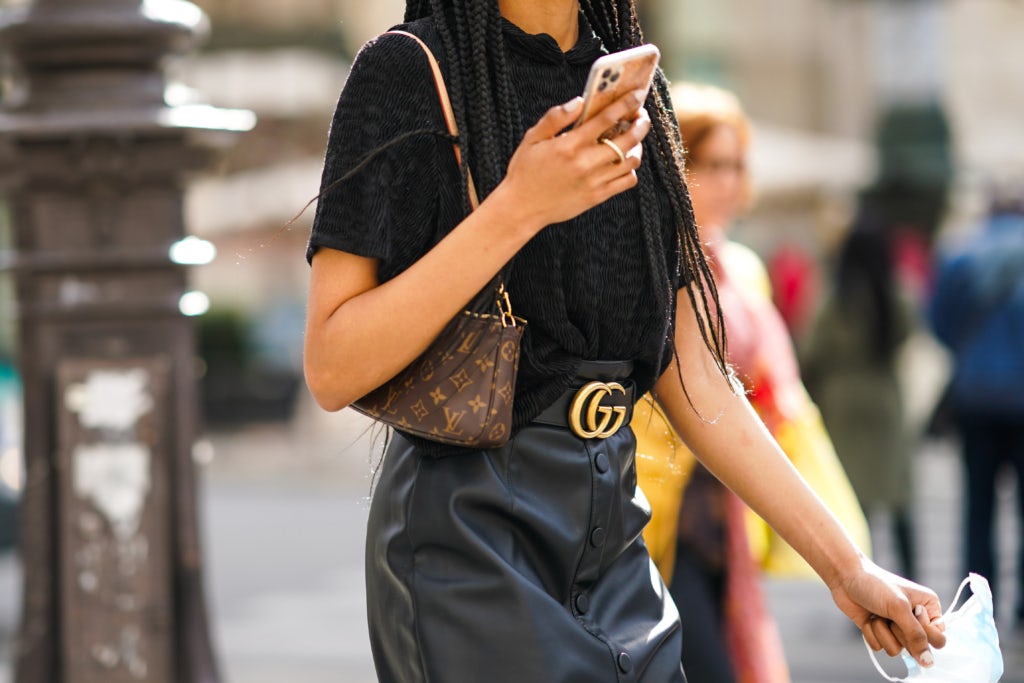
A passerby in Paris wears a Vuitton bag a Gucci belt | Source: Getty Images
LVMH misses profit expectations. While Chief Financial Officer Jean-Jacques Guiony said LVMH had slashed operating costs by 29 percent, and raised prices by 5 percent globally, the conglomerate’s operating profit still fell to €1.67 billion ($1.96 billion) in the first half of 2020, worse than analyst predictions of €2.32 billion, as revenue fell 38 percent in the second quarter.
Kering sales fall 43.7 percent in Q2. The results were slightly better than analyst expectations of a 46 percent decline, but the luxury group said it could not reasonably forecast its revenue or margins for the remainder of 2020. Kering’s operating margin contracted to 17 percent, while rival LVMH, despite a slightly smaller sales decline, saw its operating profit shrink to 9 percent.
Hermès Q2 revenue drops below analyst predictions. Despite its reputation as a resilient luxury player thanks to its perennially in-demand Birkin and Kelly bags, sales at Hermès dropped 42 percent, compared to analyst expectations of a 40 percent decline at constant exchange rates.
Prada sales fall 32 percent in H1. The Italian group recorded a net loss of €180 million (about $211 million) for the first half of 2020, in what Chief Executive Patrizio Bertelli called “a temporary interruption of our growth growth trajectory” due to the coronavirus. While wholesale sales plummeted by as much as 71 percent, Prada’s e-commerce sales more than doubled and the company remains bullish about its plans to eradicate end-of-season discounting.
Moncler sales fall 29 percent in H1 as the brand takes e-commerce in-house. The heritage skiwear brand reported an operating loss, with a negative EBIT of €35.5 million on sales of €403 million, but that hasn’t stalled plans to assume direct control of its online business, severing ties with partner Yoox Net-a-Porter to launch a fully integrated e-commerce platform in 2021. The move comes as Moncler hopes to double its share of online sales over the next three years. In 2019, e-commerce accounted for 10 percent of total sales, roughly half of which analysts estimate to have come from third-party sites.
Ferragamo misses analyst expectations with 60 percent drop in second-quarter revenue. After sales dropped more than 30 percent in the first quarter, the Florentine leather goods brand posted sales of €377 million ($442 million) for the first six months to June, below analyst estimates of €386 million. The company did not offer an outlook for the rest of the year but pointed to promising growth this month, particularly in its own retail doors in the Asia-Pacific region.
Chinese regulators approve LVMH-Tiffany deal. The merger was approved Tuesday by China’s State Administration for Market Regulation, leaving regulators in Japan, Mexico, Taiwan and the European Commission to clear it. Regulators in the United States, Australia and South Korea have already given their approval, subject to some further conditions on closing the deal. Despite initial chatter about renegotiating Tiffany’s $16.2 billion price tag in light of the coronavirus crisis and widespread civil rights protests in the US, the deal, which is of long-term strategic value to LVMH, looks like it will go ahead as planned.
Selfridges to cut 450 jobs. The UK department store plans to cut 14 percent of its workforce as it braces for a slow recovery in what Group Managing Director Anne Pitcher described as the “toughest decision we have ever had to take.” Like most luxury retailers, Selfridges has been hit hard by the closure of non-essential stores under lockdown, as well as the significant loss of revenue from tourist foot traffic that will be slow to return.
Victoria’s Secret to lay off 15 percent of HQ staff. The L Brands-owned lingerie brand will cut about 850 jobs from its headquarters and could close as many as 250 stores this year, in a bid to save an expected $400 million in annual costs. The cost-cutting measures come as L Brands looks to spin off Victoria’s Secret as a separate entity from its more promising stablemate Bath & Body Works. Earlier this year, private equity firm Sycamore Partners walked away from its deal to acquire Victoria’s Secret for $525 million.
Victoria Beckham to cut staff, slim down collections. The pop star-turned-designer plans to cut around 20 jobs, or a fifth of her workforce, and reduce the size of her seasonal collections by 30 to 40 percent. The brand has posted losses for 11 years in a row and, prior to the coronavirus crisis, had hoped to turn a profit this cycle. Beckham previously drew criticism for furloughing 30 of her label’s employees on a UK government scheme while having an estimated personal net worth of £335 million.
Issey Miyake discontinues Issey Miyake Men line. The brand said the decision was made prior to the pandemic, making Autumn/Winter 2020 its final collection. Creative Director Yusuke Takahashi departed in January after 6 years in the role. In light of this development, Issey Miyake’s popular Homme Plissé line may become a focus for the brand’s menswear strategy.
Michael Kors to show Spring/Summer 2021 digitally in October. The American designer previously said he won’t be showing during New York Fashion Week in September to avoid the flurry of new clothes being showcased during the period. Instead, he is opting to present the collection on October 15 via the brand’s social and digital channels.
THE BUSINESS OF BEAUTY
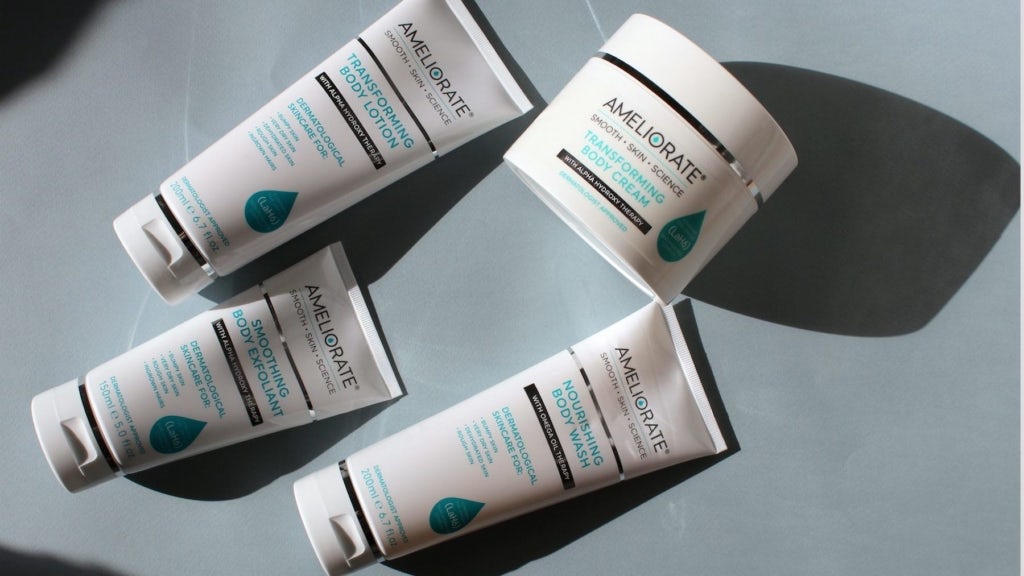
Products by The Hut Group-owned Ameliorate | Source: Courtesy Ameliorate
The Hut Group reportedly exploring IPO. The health, beauty and retail group that counts Espa, Lookfantastic and MyBag among its brands has appointed a range of investment banks with a view to potentially list this year, according to a report by The Financial Times citing two people familiar with the matter. A third source said the The Hut Group was valued at more than £4 billion (about $5.2 billion).
Victoria Beckham Beauty debuts in China. The brand launched with Alibaba-owned Tmall Global on July 27 and tapped popular influencer Viya for a live Q&A with Beckham to mark the occasion. First released in the UK in September 2019, the brand comprises “clean” skincare and makeup formulations and touted an exclusive “Power Glow Set” for its launch into the Chinese market.
PEOPLE
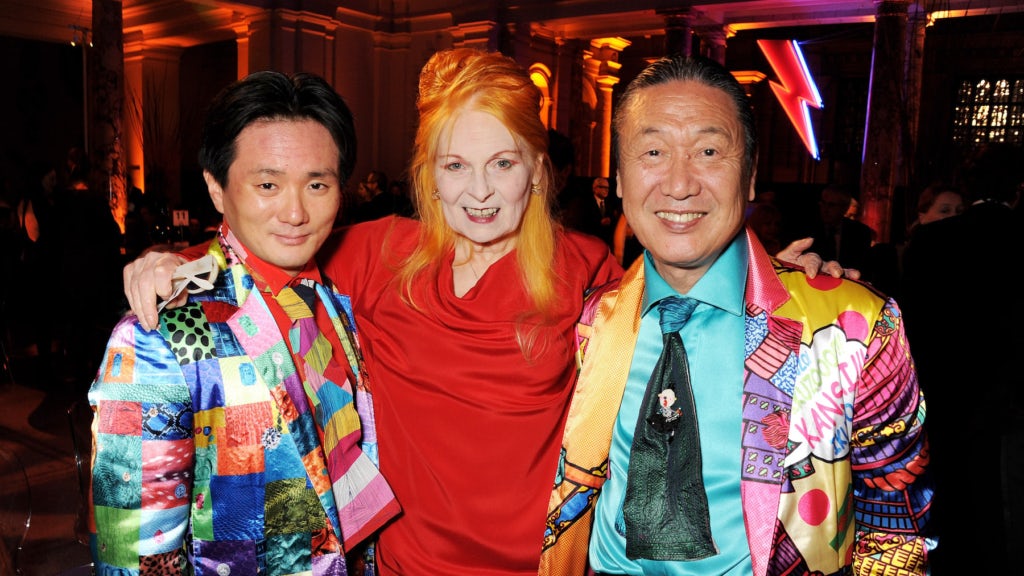
Taro Otsuka, Dame Vivienne Westwood and Kansai Yamamoto | Source: Dave M. Benett/Getty Images
Avant-garde fashion designer Kansai Yamamoto dies aged 76. Yamamoto, a pioneer of Japanese fashion and frequent collaborator with David Bowie, passed away on July 21 after living with acute myeloid leukemia. While his funeral has already taken place, there may be a public ceremony at a later date.
Nike has a new diversity chief. Felicia Mayo, Tesla’s former diversity lead who joined Nike last year as vice president of human resources and diversity and inclusion, replaces Kellie Leonard as director of diversity and inclusion at the sportswear giant.
Chrissy Rutherford and Danielle Prescod form D&I consultancy. Rutherford, formerly special projects director at Harper’s Bazaar, and Prescod, style director for Black Entertainment Television, have launched 2BG (2 Black Girls) to help brands in matters of crisis management and diversity and inclusion.
MEDIA AND TECHNOLOGY

An issue of O: The Oprah Magazine | Source: Courtesy
O: The Oprah Magazine to cease regular print editions. The 20-year-old title, a joint venture between Hearst and Oprah Winfrey’s Harpo Inc. that boasts a circulation of 2.3 million, will stop producing monthly issues after December 2020. With an audience of 8 million, O’s separate digital arm, OprahMag.com, will become the greater focus.
Hearst Magazines CFO steps in as Troy Young’s interim successor. Executive Vice President and Chief Financial Officer Debi Chirichella will serve as acting president after Troy Young resigned last week following a New York Times exposé on allegations of his inappropriate behaviour among Hearst employees.
Diet Prada puts up a paywall. The fashion industry watchdog has started to produce exclusive articles and content available to paying subscribers via Patreon. With more than 2 million Instagram followers, Diet Prada has previously monetised its platform through branded merchandise and a paid partnership with MatchesFashion.
Boohoo plans to open its own “model factory” in Leicester. Chief Executive John Lyttle said he plans to set up the venture, which will employ as many as 250 people, with an existing supplier. The news comes after the ultra-fast fashion group came under intense public scrutiny for its alleged use of suppliers that underpaid workers and failed to observe social distancing measures during the height of the coronavirus lockdown.
Nike to scrap investment in its state-of-the art Arizona shoe factory. The move marks an abrupt change to the company’s plans to build an “Air Manufacturing Innovation” facility, in Goodyear, Arizona, a $184 million investment that was slated to create 500 jobs. Nike declined to comment on how this decision will affect employees, or whether they plan to sell the property.
Compiled by Rachel Deeley.
BoF Professional is your competitive advantage in a fast-changing fashion industry. Missed some BoF Professional exclusive features? Click here to browse the archive.

